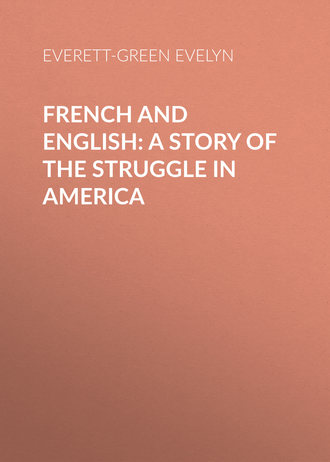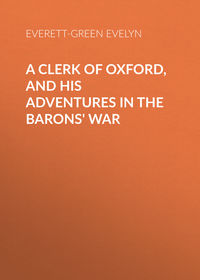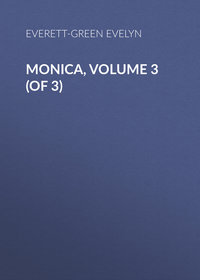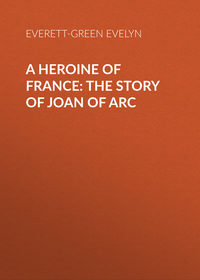 полная версия
полная версияFrench and English: A Story of the Struggle in America
Both wore the look of travellers; both were tanned by exposure, and were clad in stained and curious garments, such as betokened the life of the wilderness. Jack was instantly and keenly interested. He himself would willingly have been a backwoodsman had he been able to adopt that adventurous life.
Ashley saw the look he bent upon the travellers, and he made them known to one another.
"These friends have travelled far from the lands of the south, and have been friends in need to our kinsmen yonder. Fritz Neville and Julian Dautray are their names.
"Susanna, set food before them. Your mother will not be able to think of aught just now. We must let her have her cry out before we trouble her."
The rest of the party seated themselves, whilst in the recess by the window Hannah stood between the brothers she had parted from ten years ago, listening to their tale, and weeping as she listened.
Ashley turned to his two guests, who were eating with appetite from the well-filled platters placed before them, and he began to speak as though taking up a theme which had lately been dropped.
"It is no wonder that you are perplexed by what you hear and see in this city. I will seek to make the point at issue as clear to you as it may be. You have doubtless heard of the Penn family, from whom this colony takes its name. Much we owe to our founder-his wisdom, liberality, and enlightenment; but his sons are hated here. They are absent in England, but they are the proprietaries of vast tracts of land, and it is with regard to these lands that the troubles in the Assembly arise. The proprietaries are regarded as renegades from the faith; for the Assembly here is Quaker almost to a man. They hate the feudalism of the tenure of the proprietaries, and they are resolved to tax these lands, although they will not defend them, and although no income is at present derived from them."
"Have they the power to do so?" asked Julian.
"Not without the consent of the Governor. That is where the whole trouble lies. And the Governor has no power to grant them leave to tax the proprietary lands. Not only so, but he is expressly forbidden by the terms of his commission to permit this taxation. But the Assembly will not yield the point, nor will they consent to furnish means for the defence of the colony until this point is conceded. That is where the deadlock comes in. The Governor cannot yield; his powers do not permit it. The Assembly will not yield. They hate the thought of war, and seem glad to shelter themselves behind this quibble. For a while many of us, their friends, although not exactly at one with them in all things, stood by them and upheld them; but we are fast losing patience now. When it comes to having our peaceful settlers barbarously murdered, and our western border desolated and encroached upon; when it becomes known that this is the doing of jealous France, not of the Indians themselves, then it is time to take a wider outlook. Let the question of the proprietary lands stand over till another time; the question may then be settled at a less price than is being paid for it now, when every month's delay costs us the lives of helpless women and children, and when humanity herself is crying aloud in our streets."
Ashley, although he had long been on most friendly terms with the Quaker population of the town, was not by faith a Quaker, and was growing impatient with the Assembly and its stubborn policy of resistance. He felt that his old friend Franklin should know better, and show a wider spirit. He had acted with promptness and patriotism earlier in the year, when Braddock's luckless expedition had applied to him for help. But in this warfare he was sternly resolved on the victory over the Governor, and at this moment it seemed as though all Philadelphia was much more eager to achieve this than to defend the borders of the colony.
Hitherto the danger had not appeared pressing to the eastern part of the colony. They were in no danger from Indian raids, and they had small pity for their brethren on the western frontier. Between them and the encroaching Indians lay a population, mostly German, that acted like a buffer state to them; and notwithstanding that every post brought in urgent appeals for help, they passed the time in wrangling with the Governor, in drawing up bills professing to be framed to meet the emergency, but each one of them containing the clause through which the Governor was forced to draw his pen.
Governor Morris had written off to England stating the exceeding difficulty of his position. His appeals to the Assembly to defend the colony were spirited and manly. He was anxious to join with the other colonies for an organized and united resistance, but this was at present extremely difficult. Others before him had tried the same policy, but it had ended in failure. Petty jealousies did more to hold the colonies apart than a common peril to bind them together. Political and religious strife was always arising. There was nothing to bind them together save a common, though rather cold, allegiance to the English King. Now and again, in moments of imminent peril, they had united for a common object; but they fell apart almost at once. Each had its own pet quarrel with its Governor, which was far more interesting to the people at the moment than anything else.
Julian and Fritz listened in amaze as Ashley, who was a well-informed man and a shrewd observer, put before them, as well as he was able, the state of affairs reigning in Pennsylvania and the sister states.
"I am often ashamed of our policy, of our bickerings, of our tardiness," concluded the good man; "yet for all that there is stuff of the right sort in our people. We have English blood in our veins, and I always maintain that England is bound to be the dominant power in these lands of the west. Let them but send us good leaders and generals from the old country, and I will answer for it that the rising generation of New England will fight and will conquer, and drive the encroaching French back whence they came!"
Chapter 4: An Exciting Struggle
It was an exciting scene. Susanna stood at the window, and gazed eagerly along the street, striving hard to obtain a sight of the seething crowd in the open square.
She could see the tall, haggard form of her Uncle Charles, as she called him. He was standing upon a little platform that his friends had erected for him in front of the Assembly Rooms, and he was speaking aloud to the surging crowd in accents that rang far through the still air, and even reached the ears of the listeners at the open window.
For once Hannah made no protest when the girl thrust out her head. She herself seemed to be striving to catch the echoes of the clear, trumpet-like voice. Her colour came and went in her cheeks; her breast heaved with the emotion which often found vent in those days in a fit of silent weeping.
"Mother dear, do not weep; they shall be avenged! Nobody can listen to Uncle Charles and not be moved. Hark how they are shouting now-hark! I can see them raising their arms to heaven. They are shaking their fists in the direction of the windows of the Assembly House. Surely those cowardly men must be roused to action; they cannot hear unmoved a tale such as Uncle Charles has to tell!"
"Yet even so the dead will not be restored to life; and war is a cruel, bitter thing."
"Yes, but victory is glorious. And we shall surely triumph, for our cause is righteous. I am sure of that. And Julian Dautray says the same. I think he is a very good man, mother; I think he is better than the Quakers, though he does not talk as if he thought himself a saint.
"O mother, there is Uncle Humphrey looking up at us! I pray you let me go down to him. I long so greatly to hear what Uncle Charles is saying. And I shall be safe in his care."
"I think I will come, too," said Hannah, whose interest and curiosity were keenly aroused; and after signalling as much to Humphrey, they threw on their cloaks and hoods, and were soon out in the streets, where an excited crowd had gathered.
"The posts have come in," said Humphrey, as they made their way slowly along, "and there is news of fresh disasters, and nearer. In a few minutes we shall have more news. Men have gone in who promise to come out and read us the letters. But the bearers themselves declare that things are terrible. The Germans have been attacked. A Moravian settlement has been burnt to the ground, and all its inhabitants butchered. Families are flying from the border country, naked and destitute, to get clear of the savages and their tomahawks. Every where the people are calling aloud upon the Assembly to come to their succour."
The crowd in the street was surging to and fro. Some were Quakers, with pale, determined countenances, still holding to their stubborn policy of non-resistance to the enemy, but of obstinate resistance to the Governor and the proprietaries. The sight of these men seemed to inflame the rest of the populace, and they were hustled and hooted as they made their way into the Assembly; whilst the Governor was cheered as he went by with a grave and troubled face, and on the steps of his house he turned and addressed the people.
"My friends," he said, "I am doing what I can. I have written to the proprietaries and to the government at home. I have told them that the conduct of the Assembly is to me shocking beyond parallel. I am asking for fresh powers to deal with this horrible crisis. But I cannot look for an answer for long; and meantime are all our helpless settlers in the west to be butchered? You men of the city, rise you and make a solemn protest to these obstinate rulers of yours. I have spoken all that one man may, and they will not hear. Try you now if you cannot make your voice heard."
"We will, we will!" shouted a hundred voices; and forthwith knots of influential men began to gather together in corners, talking eagerly together, and gesticulating in their excitement.
And all this while Charles, wild-eyed and haggard, was keeping his place on the little platform, and telling his story again and again to the shifting groups who came and went. Men and women hung upon his words in a sort of horrible fascination. Others might talk of horrors guessed at, yet unseen; Charles had witnessed the things of which he spoke, and his words sent thrills of horror through the frames of those who heard. Women wept, and wrung their hands, and the faces of men grew white and stern.
But upon the opposite side of the square another orator was haranguing the crowd. A young Quaker woman had got up upon some steps, moved in spirit, as she declared, to denounce the wickedness of war, and to urge the townsmen to peaceful methods. Her shrill voice rose high and piercing, and she invoked Heaven to bless the work of those who would endure all things rather than spill human blood.
But the people had heard something too much of this peaceful gospel. For long they had upheld the policy of non-resistance. They had their shops, their farms, their merchandise; they were prosperous and phlegmatic, more interested in local than in national issues. They had been content to be preached at by the Quakers, and to give passive adhesion to their policy; but the hour of awakening had come. The agonized cries of those who looked to them for aid had pierced their ears too often to be ignored. Humanity itself must rise in answer to such an appeal. They were beginning to see that their peace policy was costing untold human lives, amid scenes of unspeakable horror.
They let the woman speak in peace; they did not try to stop her utterances. But when a brother Quaker took her place and began a similar harangue, the young men round raised a howl, and a voice cried out:
"Duck him in the horse pond! Roll him in a barrel! Let him be tarred and feathered like an Indian, since he loves the scalping savages so well. Who's got a tomahawk? Let's see how they use them. Does anybody know how they scalp their prisoners? A Quaker would never miss his scalp; he always has his hat on!"
A roar of laughter greeted this sally; and a rush was made for the unlucky orator, who showed a bold front enough to the mob. But at that moment public attention was turned in a different direction by the appearing upon the steps of the Assembly Rooms of a well-known citizen of high repute, who had until latterly been one of the peace party, but who of late had made a resolute stand, insisting that something must be done for the protection of the western settlers, and for the curbing of the ambitious encroachments and preposterous claims of France.
This grave-faced citizen came out with some papers in his hand, and the crowd was hushed into silence.
Overhead anxious faces could be seen looking out at the window. It was not by the wishes of the Assembly that such letters were made public; but many of them had been addressed to James Freeman himself, and they could not restrain him from doing as he would with his own.
"My friends," he said, and his voice rose distinct in the clear air, "we have heavy tidings today. You shall hear what is written from some sufferers not far from Fort Cumberland, where forty white men, women, and children were barbarously murdered a few days back.
"'We are in as bad circumstances as ever any poor Christians were ever in; for the cries of the widowers, widows, fatherless and motherless children are enough to pierce the hardest of hearts. Likewise it is a very sorrowful spectacle to see those that escaped with their lives with not a mouthful to eat, or bed to lie on, or clothes to cover their nakedness or keep them warm, but all they had consumed to ashes. These deplorable circumstances cry aloud to your Honour's most wise consideration how steps may speedily be taken to deliver us out of the hand of our persecutors the cruel and murderous savages, and to bring the struggle to an end.'"
The reader paused, and a low, deep murmur passed through the crowd, its note of rage and menace being clearly heard. The speaker took up another paper and recommenced.
"This comes from John Harris on the east bank of the Susquehanna:
"'The Indians are cutting us off every day, and I had a certain account of about fifteen hundred Indians, besides French, being on their march against us and Virginia, and now close on our borders, their scouts scalping our families on our frontier daily.'"
Another pause, another murmur like a roar, and a voice from the crowd was raised to ask:
"And what says the Assembly to that?"
"They say that if the Indians are rising against us, who have been friendly so long, then we must surely have done something to wrong them; and they are about to search for the cause of such a possible wrong, and redress it, rather than impose upon the colony the calamities of a cruel Indian war!"
A yell and a groan went up from the crowd. For a moment it seemed almost as though some attack would be made upon the Assembly House. The habits of law and obedience were, however, strong in the citizens of Philadelphia, and in the end they dispersed quietly to their own homes; but a fire had been kindled in their hearts which would not easily be quenched.
Days were wasted by the Quakers in an unsuccessful attempt to prove that there had been some fraud on the part of the Governor in a recent land purchase from the Indians. And they again laid before the Governor one of their proposals, still containing the clause which he was unable to entertain, and which inevitably brought matters to a deadlock.
The Quakers drew up a declaration affirming that they had now taken every step in their power, "consistent with the just rights of the freemen of Pennsylvania, for the relief of the poor distressed inhabitants," and further declared that "we have reason to believe that they themselves would not wish us to go further. Those who would give up essential liberty to purchase a little temporary relief and safety deserve neither liberty nor safety."
The Governor, in a dignified reply, once more urged upon them the absolute necessity of waiving for the present the vexed question of the proprietary estates, and passing a bill for the relief of the present sufferers; but the Quakers remained deaf and mute, and would not budge one inch from their position.
All the city was roused. In houses like that of Benjamin Ashley, where people were coming and going the whole day long, and where travellers from these border lands were to be found who could give information at first hand, the discussion went on every day and all day long. Ashley himself was keenly excited. He had quite broken away from a number of his old friends who supported the Assembly in its blind obstinacy. Nobody could sit by unmoved whilst Charles and Humphrey Angell told their tale of horror and woe; and, moreover, both Julian Dautray and Fritz Neville had much to tell of the aggressive policy of France, and of her resolute determination to stifle and strangle the growing colonies of England, by giving them no room to expand, whilst she herself claimed boundless untrodden regions which she could never hope to populate or hold.
Fresh excitements came daily to the city. Early one morning, as the tardy daylight broke, a rumble of wheels in the street below told of the arrival of travellers. The wheels stopped before Ashley's door, and he hastily finished his toilet and went down.
In a few moments all the house was in a stir and commotion. A terrible whisper was running from mouth to mouth. That cart standing grimly silent in the street below carried, it was said, a terrible load. Beneath its heavy cover lay the bodies of about twenty victims of Indian ferocity; and the guardians of the load were stern-faced men, bearing recent scars upon their own persons, who ate and drank in stony silence, and only waited till the Assembly had met before completing their grim mission.
The thing had got wind in the town by now, and the square space was thronged. The members of the Assembly looked a little uneasy as they passed through the crowd, but not a sound was made till all had gathered in the upper room.
Then from out the yard of the inn was dragged the cart. No horses were fastened to it. The young men of the city dragged it out and pushed it along. The silent, grim-faced guardians walked in front. As it reached the square the crowd sent up a groaning cry, and opened right and left for the dreadful load to be set in position before the windows of the great room where the Assembly had met.
Then the cover was thrown back, and yells and cries arose from all. Shouts were raised for the Assembly to come and look at their work.
There was no resisting the mandate of the crowd. White and trembling, the members of the Assembly were had out upon the steps, and forced to look at the bodies of their victims. The crowd hooted, groaned, yelled with maddened fury. The advocates of peace shrank into themselves, appalled at the evidences of barbarities they had sought to believe exaggerated. It was useless now to attempt to deny the truth of what had been reported.
Back they slunk into the Assembly House, white and trembling, and for the moment cowed. The cart was moved on, and stopped in front of house after house where notable Quakers dwelt who were not members of the Assembly. They were called to come to their windows and look, and were greeted with hisses and curses.
The very next day a paper, under preparation by a number of the leading citizens at the suggestion of the Governor, was presented to the Assembly under the title of a "Representation." It contained a stern appeal for the organization of measures of defence, and ended by the dignified and significant words:
"You will forgive us, gentlemen, if we assume characters somewhat higher than that of humble suitors praying for the defence of our lives and properties as a matter of grace or favour on your side. You will permit us to make a positive and immediate demand of it."
The Quakers were frightened, incensed, and perplexed. Their preachers went about the streets urging upon the people the doctrine of non-resistance, and picturing the horrors of warfare. The Assembly debated and debated, but invariably came to the conclusion that they must withstand the Governor to the last upon the question of taxation.
All the city was in a tumult and ferment; but when the news came that a settlement only sixty miles away, Tulpehocken by name, had been destroyed and its inhabitants massacred, even the advocates of peace grew white with fear, and the House began to draw up a militia law-the most futile and foolish perhaps that had ever been suggested even by lovers of peace-in the vain hope of appeasing the people.
But the people would not be appeased by a mere mockery. They clamoured for the raising of money for a systematic defence of their colony, and the ground was cut from beneath the feet of the Assembly by a letter received from England by the Governor-not indeed in response to his recent urgent appeals, but still written with some knowledge of the unsettled state of the country. In this letter the proprietaries promised a donation of five thousand pounds as a free gift for the defence of the provinces threatened in so formidable a manner, provided it was regarded as a gift and not as any part of a tax upon their estates, which were to remain free according to the old feudal tenure.
The Assembly upon hearing this could hold out no longer. They were forced by the clamour of public opinion to strike out the debated and debatable clause from the long-contested bill, and immediately it was passed into law by the Governor.
"Ay, they have come to their senses at last-when it is well nigh too late!" spoke John Stark, with a touch of bitterness in his tone. "They will furnish money now; but what can be done with the winter just upon us? For six months we must lie idle, whilst the snow and ice wrap us round. Why was not this thing done before our settlements were destroyed, and when we could have pushed forth an army into the field to drive back the encroaching foe, so that they would never have dared to show their faces upon our border again?"
Charles looked up with burning eyes.
"What say you? Six months to wait? That will not do for me! My blood is boiling in my veins; I must needs cool it! If these laggard rulers, with their clumsy methods, cannot put an army in the field before the spring, surely there are men enough amongst us to go forth-a hardy band of woodsmen and huntsmen-and hunt and harry, and slay and destroy, even as they have done!"
"That is what the Rangers do!" cried Stark, with kindling eyes; "I have heard of them before this. The Rangers of New England have done good work before now. Good thought, good thought! Why not form ourselves into a band of Rangers? Are we not strong and full of courage, seasoned to hardship, expert in our way with gun or axe? Why should we lie idle here all the long winter through? Why not let us forth to the forest-find out where help is needed most, and make here a dash and there a raid, striking terror into the hearts of the foe, and bringing help and comfort to those desolate inhabitants of the wilderness who go in terror of their lives? Why not be a party of bold Rangers, scouring the forests, and doing whatever work comes to hand? Men have banded themselves together for this work before now; why may not we do the like?"
"Why not, indeed?" cried Fritz, leaping to his feet. "I pine in the restraint of this town; I long for the forest and the plain once more. My blood, too, is hot within me at the thought of what has been done and will be done again. Let us band ourselves together as brothers in arms. There must be work and to spare for those who desire it."
Ashley thoughtfully stroked his chin, looking round the circle before him. He was a shrewd and thoughtful man, and there was nothing of cowardice in his nature, although he was cautious and careful.
"It is not a bad thought, Nephew John," he said; "and yet I had been thinking of something different for some of you intrepid and adventurous youths to do. I had thought of sending news of the state of parties here to our friends and kinsmen in England. When all is said and done, it is to England that we must look for help. She must send us generals to command us, and she must help us with her money. There are many families across the water who would open their purses on our behalf right generously were our sad case made known to them. Letters are sent continually, but it is the spoken tale that moves the heart. I had thought to send across myself to such of our friends and families as still regard us as belonging to them. If they made a response such as I look for, we should soon have means at our disposal to augment what the tardy Assembly may do by an auxiliary force, equipped and furnished with all that can be needed. But you cannot be in two places at once.









